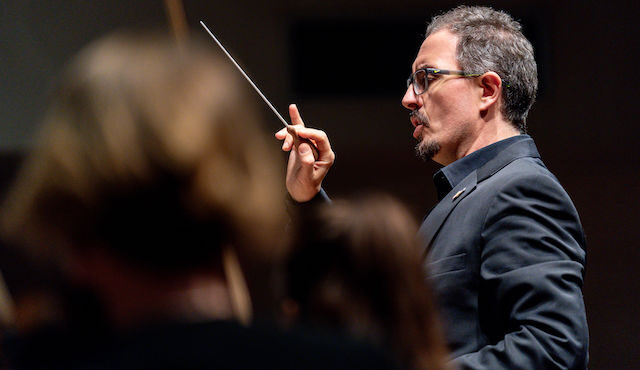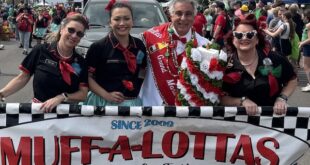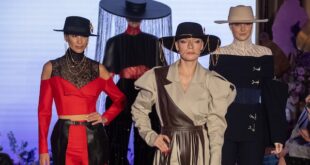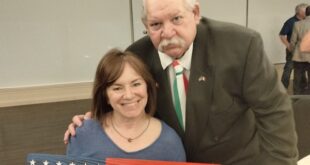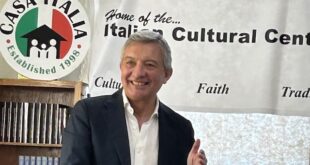Italian conductor Emanuele Andrizzi spent years laying the groundwork for the creation of the Opera Festival of Chicago, which marked its fifth season this summer.
A native of Rome, Andrizzi led the orchestral program at the Chicago College of Performing Arts at Roosevelt University for more than a decade before being appointed in August as director of orchestral studies at Shenandoah University’s Conservatory in Winchester, Virginia.
Over the years, he has conducted at Lyric Opera of Chicago, San Diego Opera, Orchestra Filarmonica Marchigiana, the Joffrey Ballet, Chicago Philharmonic, Orchestra della Città di Ravenna, Opera Theater of St. Louis and Cluj Symphony in Romania, among others. He has also collaborated with prominent music festivals, such as Grant Park and Ravinia.
Andrizzi, who lives in Chicago with his wife and three children, spoke with Fra Noi about what brought him to the Windy City and his vision to introduce local audiences to lesser-known Italian operas.
ELENA FERRARIN: How did your passion for music develop?
EMANUELE ANDRIZZI: My father liked classical music and my mom had studied piano a little bit when she was young, and they would take me to classical music concerts. My mom started me on the piano when I was about 11 and started sending me to piano lessons when I was 13. I also played the organ for many years, that was my second instrument. I was one of those kids who listened to classical music instead of listening to Duran Duran. I went to a liceo scientifico (a high school with a math/science focus) and I entered the conservatory after high school.
EF: Why did you shift to conducting?
EA: It’s something that grew in me. I used to play a lot of chamber music and I was the official accompanist for three years for the International Composition contest “Valentino Bucchi.” I really enjoyed playing with others. Conducting is a similar concept: You work with other musicians, but you are more of a leader.
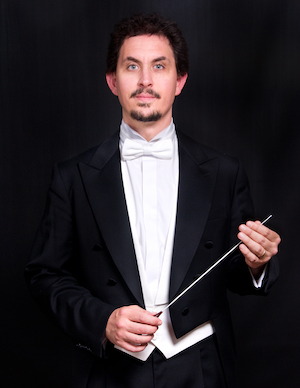 EF: What brought you to Chicago?
EF: What brought you to Chicago?
EA: I moved here in 2007 for a doctorate at Northwestern University. My research was about the difference between music directors and guest conductors. I followed Andrew Davis, the music director of the Lyric Opera of Chicago, for a year to see what he was doing and to interview him for my research.
EF: You worked at Roosevelt University from 2013 until earlier this year. What was that experience like?
EA: I was hired when Henry Fogel, who had been president of the Chicago Symphony Orchestra, was the dean of the Chicago College of Performing Arts at Roosevelt. He wanted to create a more solid, more important orchestral program, and they hired me to do this. It was very stimulating, very interesting and very challenging. I had between 75 to 100 students in the orchestral class and I did most of the great masters, from Mahler’s Symphony No. 3 to Shostakovich’s Symphony No. 10, and a lot of other stuff.
EF: Why did you take the job at Shenandoah University?
EA: After almost a decade at Roosevelt, I wanted to challenge myself with a new experience. I took a sabbatical from Roosevelt to see if I liked Shenandoah, and then I decided to stay. So now I am commuting between Washington and Chicago.
EF: What is your approach to teaching students?
EA: I really think that music is one of the few things in this world in which we can avoid fighting with each other. It’s one of the great unifying things. We all want to achieve the same goal, to make great concerts. I really try to foster this kind of approach to music, to play together and to partner with each other. I am not the old-style conductor who yells and demeans people. Of course, sometimes you lose your patience, but not often. At that stage, they are already skilled enough to know some of the repertoire and play their instruments. They just need guidance to refine their skills — and that’s my job, to help them develop their affinities and qualities.
EF: You spearheaded the creation of the Opera Festival of Chicago. What inspired you?
EA: There wasn’t enough Italian opera in Chicago, just the same ones over and over. There is a lot of Italian opera that is not very well-known in America. I spent almost five years just talking to people, meeting, gathering ideas. I also took classes for a master’s in arts administration at Roosevelt to learn about fundraising, marketing and financing, so I could launch the company.
EF: Where do you perform?
EA: In different places, like the Athenaeum Center in Chicago and Cahn Auditorium in Evanston. Next year we will be in Thalia Hall in Chicago and in Skokie (in suburban Chicago). The Opera Festival is not just about bringing great masterworks that are not very well known to the Chicago public, but also to create opera in a fiscally responsible way. Theaters in America are often too large for opera, which is meant to be sung without microphones. Opera is also very expensive — probably the most expensive thing after Taylor Swift concerts!
EF: What is your annual budget?
EA: Under half-a-million per year. Most of our funding is from fundraising. Ticket sales is a small share, as in every company in America. The Illinois Arts Council, the city of Chicago, the Italian Cultural Institute of Chicago, and Roosevelt University and DePaul University have supported us over the years. It takes a village.
EF: How would you describe the general public’s appreciation for opera nowadays?
EA: The public we had at the Opera Festival has been growing regularly throughout the seasons. Of course, it’s a process, particularly for a new company. People have to discover you. Last year, we had an article in Opera Magazine. For the past two years, our operas have been broadcast by WFMT-FM and also nationally and internationally on the radio. But the public is not the same as before the pandemic. People are not going for very long shows anymore, so we try to have shows that are 1 to 1-1/2 hours. It helps attract a younger public, which has been a problem for many companies. So far, it’s paid off.
EF: What are your plans for the future?
EA: To grow the Opera Festival to the next level. This season, we doubled the size of our board, which is really important for art companies and nonprofits, and we had two productions that were quite larger than in the past. The goal is to keep building on that, maybe with larger productions, and bring more Italian jewels to Chicago.
For more, click here.
The above appears in the October 2024 issue of the print version of Fra Noi. Our gorgeous, monthly magazine contains a veritable feast of news and views, profiles and features, entertainment and culture. To subscribe, click here.
 Fra Noi Embrace Your Inner Italian
Fra Noi Embrace Your Inner Italian


